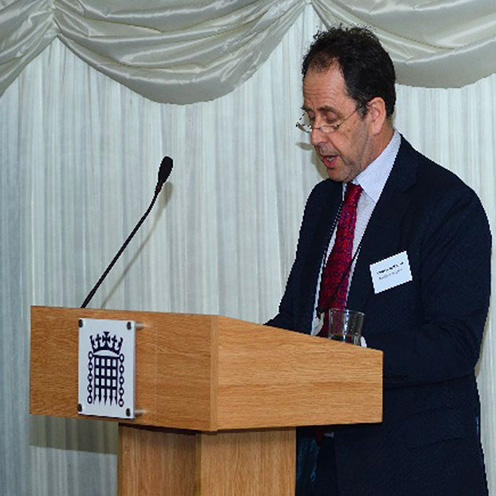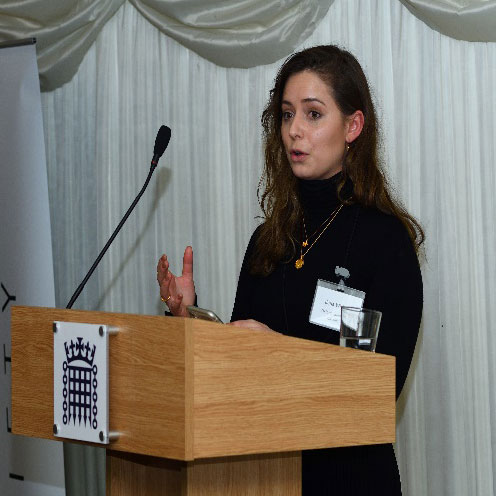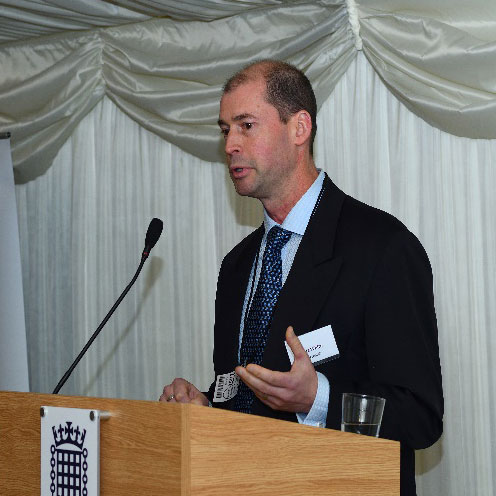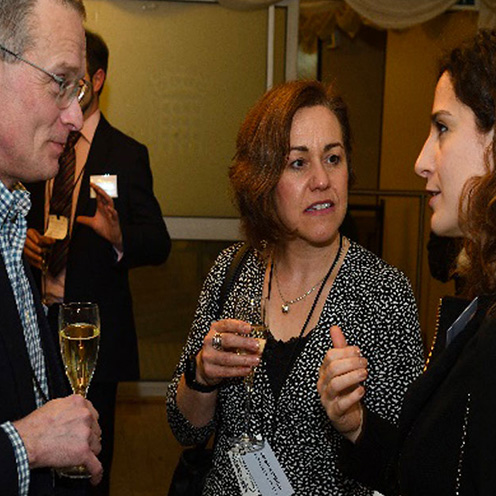February 27th, 2020
Venue: The House of Commons

Churchill Room
A perfectly-named room to host the battling Hard Tech community inside the Corridors of Power. The bust of Sir Winston peered out discreetly from an alcove behind our speakers’ table.
The purpose of the dinner was to bring the Bessemer entrepreneur hard tech community front and forward with policy makers at the House of Commons for better mutual understanding, with the support of the Foundation for Science and Technology.
THE FOUNDATION FOR SCIENCE AND TECHNOLOGY
The Foundation brings together representatives from Parliament, government, industry and the research community for debate of policy issues that have a science, technology or medical element. The Chair of the Foundation, Lord David Willetts, is a keen supporter of the Hard Tech (Deep Tech) community.

THE BESSEMER WORLD OF HARD TECH
Reflections on who we are and the aims of the dinner which might have been developed further in a discussion.
The Disruptors
The Bessemer Society offers a window onto a world of manufacturing that is based on advanced technology, which can be extremely disruptive to existing markets, making it usually right for addressing the solutions needed to manage Climate Change, Sustainability, and Pandemics! This was illustrated by the leaders of the companies chosen to make Self-Introductions. Reminding government of this is one way the Bessemer Society can offer itself as a platform for members.
Advanced economy
The Bessemer Society’s members have founded and / or lead the companies which make the enabling underlying technologies on which emerging markets and industries depend – for example advanced materials, semiconductor and photonic devices, and novel sensors. The ability to integrate these into a value chain is integral to the development of an advanced economy.
Sovereign value chain
The problem is that we have lost the depth of the end-to-end supply chain required to scale these technologies within the UK. Previously we had companies like Plessey, GEC, STC, Marconi, Thorn-EMI and Ferranti who were not only national champions but leading international players. We do still have major niche, high performance companies across a range of sectors. These include companies in automotive, aerospace, energy, oil and gas, defence, pharmaceuticals and chemicals. Drew Nelson is arguing that we have the opportunity use an enabling technology like compound semiconductors, where the UK has a strong foundation, to build end to end supply chains for many of these industries.
Importance of manufacturing
Gordon Sanghera of Oxford Nanopore is passionate about the additional value added and protection that manufacturing offers when it is closely integrated with R&D. Bringing Gordon and Drew together therefore from overlapping fields of technology, who share the same understanding about the importance of manufacturing, helped each to amplify their message.
Joined Up Strategy
The Challenge Funds and Sector Strategies which Innovate UK is organising are providing support for major emerging industries based on electrification, e.g. the Faraday Challenge and the Drive Electric Revolution Challenge. What is needed still is better support for cross-cutting technologies, such as compound semiconductors. This will require an even deeper joined up strategy which sees the bigger picture of what is needed to integrate the multiple underlying technologies that underpin emerging industries and markets.
Placing bets on winners
The government’s industrial policy has moved in the direction of picking winners rather than letting market forces decide. We therefore have more opportunity as a Society to influence the kind of technologies and industries which should be supported, or as Gordon Sanghera puts it, where to decide to make big bets and to avoid making weak bets.
Operational needs
As we build local, sovereign supply chains for emerging markets and industries it is also necessary to build capacity, such as people trained with the right skills. To illustrate this Isobel Sheldon of the UK-Battery Industrialisation Centre, explained the need (and urgency) to recruit and train enough people to work in the emerging electric vehicle industry.
The role of large corporations
It is also essential that major companies are helping to drive the end to end supply chain beyond the early development phase but as eventual large-scale customers. Larger companies tend to be risk averse and unwilling to engage deeply with the earlier end of the supply chain. Without however their deeper engagement and leadership it will be harder to achieve an end to end sovereign supply chain across the many technology areas and industries that would benefit. This is why the Bessemer Society tries to engage with the larger companies by inviting them to our regional dinners.

The serried ranks of Hard Tech Entrepreneurs during the presentations before dinner.
WESTMINSTER PRESENTATIONS
This part of the evening took place on the Terrace Pavilion. Nearly 90 guests sat to hear from leading technology disruptors and key parts of the policy community.
PROFESSOR LORD ROBERT MAIR
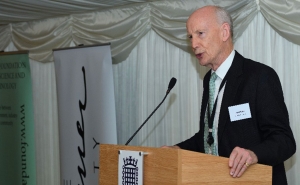 Lord Mair, Emeritus Professor of Civil Engineering at Cambridge University, became President of the Institution of Civil Engineers in November 2017. He was appointed an independent crossbencher in the House of Lords in October 2015, where he sits on the House of Lords Select Committee on Science and Technology. Utterberry Ltd, led by Heba Bevan (member of the Bessemer Society) is a spinout from his group at Cambridge.
Lord Mair, Emeritus Professor of Civil Engineering at Cambridge University, became President of the Institution of Civil Engineers in November 2017. He was appointed an independent crossbencher in the House of Lords in October 2015, where he sits on the House of Lords Select Committee on Science and Technology. Utterberry Ltd, led by Heba Bevan (member of the Bessemer Society) is a spinout from his group at Cambridge.
Lord Mair made the point that new technology could dramatically change the way in which the building industry works. The Science and Technology Select Committee for example had undertaken a recent review of off-site manufacturing which brings building components to the site reducing time, cost and the environmental impact of doing all the building work on site. He also referred to the way sensors and fibre optics will improve the safety of bridges, tunnels and other infrastructure.
PROFESSOR LORD ALEC BROERS
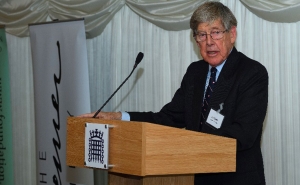 Professor Lord Alec Broers was Head of Engineering at Cambridge University and Master of Churchill College before becoming Vice-Chancellor of the University from 1996-2003. He was made a Life Peer in 2004. Prior to Cambridge he worked in the R&D laboratories of IBM in the USA for nineteen years, ultimately holding responsibility for the development of semiconductor chip technologies. He has served on the boards of several high technology start-up companies and is presently on the Board of FlexEnable, which is a Bessemer Society member.
Professor Lord Alec Broers was Head of Engineering at Cambridge University and Master of Churchill College before becoming Vice-Chancellor of the University from 1996-2003. He was made a Life Peer in 2004. Prior to Cambridge he worked in the R&D laboratories of IBM in the USA for nineteen years, ultimately holding responsibility for the development of semiconductor chip technologies. He has served on the boards of several high technology start-up companies and is presently on the Board of FlexEnable, which is a Bessemer Society member.
Lord Broers made a tremendous impact on the wider Cambridge technology community during his period as Vice Chancellor, which was still reverberating when I moved to Cambridge from Japan in 2007. His impact drew from the fact that he was the first person picked for the role from industry. Due to his strong technology background he played a major role in fostering the technology boom which accelerated in Cambridge during his occupancy.
In his presentation to us Lord Broers listed three things that together provided an almost Zen-like insight to our dilemma as a manufacturing economy, familiar to Bessemer members, yet not in such Zen-like simplicity:
- In the UK, we don’t have enough people in the finance sector with the right skills to make informed decisions about investing in high technology manufacturing.
- It is actually necessary to manufacture goods.
- In the UK, we don’t believe in 1&2.
So there we have it. He also pointed out how many major technology projects have been abandoned over the years. There are many reasons, but it is vital that government provides long-term support for important projects, through subsidies and the like. He also added that, as we also often say, the standing of the engineering profession needs to be raised much higher.
JESSICA SKILBECK
Director of Industrial Strategy at BEIS
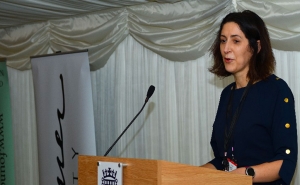 Jessica described three big headwinds for the further development of the industrial strategy:
Jessica described three big headwinds for the further development of the industrial strategy:
1. The new legal commitment to Net Zero by 2050 (which post-dates the 2017 Industrial Strategy).
2. The political focus on “levelling up” (addressing the regional disparity in productivity growth).
3. Having left the EU, the need to negotiate new trading arrangements.
BEIS are interested in how all of these interact, in some areas complementing each other, in other areas requiring trade-offs. She noted too the current government’s focus on innovation, and increasing money for science and innovation, which is encouraging for our membership.
BESSEMER MEMBER PRESENTATIONS
The presentations were designed to highlight emerging and disruptive technologies where UK companies have a leadership or unique position.
Andrew Rickman, Founder, CEO, Rockley Photonics Ltd
Working on next generation optical computers, specifically the manufacture and integration of silicon photonics chips. Huge applications – “Doctor’s surgery on your wrist”.
David Kingham, Co-Founder, Tokamak Energy Ltd
UK has a world leading centre for fusion research at Culham, and world leading capability to make high-field semiconductor magnets around Oxford. Now developing a tokamak fusion reactor with 100 million degrees Celsius plasma, currently in testing.
Giorgia Longobardi, Co-Founder, CEO, Cambridge GaN Devices Ltd
Producing Gallium Nitride transistors which are smaller and faster than Silicon equivalents. Have demonstrated prototypes, currently going through full qualification which will take them to market. Important to develop the supply chain in the UK, however,
Ilana Wisby, Co-Founder, CEO, Oxford Quantum Circuits Ltd
Applications across many sectors – e.g. pharmaceuticals, materials, Big Data, AI, defence. They produce the most advanced quantum computer available in the UK based on proprietary superconducting circuits for the quantum computer core. Need a solid ecosystem, and government as a key partner including access to skills, both academic and business.
Scott White, Co-Founder, CEO, PragmatIC Ltd
Produce very thin, ultra-low cost flexible integrated circuits. Produced first product last year, sold 20 million in 2 months. Increasingly looking for applications in public sector – e.g. predict £400M pa saving for NHS.

Sweeping view of the attendees during the presentations.
BESSEMER PRESENTERS
- Giorgia Longobardi, Cambridge GaN Device
- David Kingham, CoFounder Tokamak Energy
- Andrew Rickman, CEO, Rockley Photonics
- Ilana Wisby CEO Oxford Quantum Circuits
- Scott White, CEO PragmatIC
- Follow up with speakers
NETWORKING BEFORE DINNER
- Foreground Sir Colin Humphreys and Lord Willetts
- After the presentations
- Catch up time
DINNER IS ON
- Take your seats please
- Top Table
- Cheering the guests along
SPEAKERS: ISOBEL SHELDON
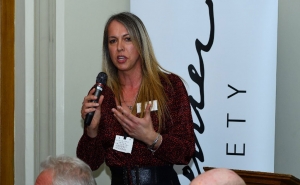
Isobel heads up Business Development at the UK Battery Industrialisation Centre (UK-BIC). One of their targets is to build up the capability of the UK’s nascent EV battery industry.
She began by giving an introduction to the government’s investment in the sector. Batteries are a very large percentage of the cost of a vehicle, so critical to the future of the industry. The Faraday Battery Challenge is designed to bring forward new battery chemistries. It is currently funding 10 programmes of applied research at £5-10M per programme. In addition to this Innovate UK is spending £88M on R&D into battery technology over more than 60 programmes.
The government’s largest investment of £129M is into UK-BIC to build where the aim is to set up an open access battery industrialisation centre – not just batteries for EVs, but all batteries. This is “unique” type of facility anywhere in the world. As an open facility it allows companies to use the facilities to scale up battery chemistries to low production volumes so that SMEs in particular do not have to purchase capital equipment. It allows companies to use the facilities for cell production and packaging, with their own staff to operate the production line. The aim as well is to provide a training facility.
The automotive industry employs some >770k jobs. The challenge is to re-train them for the electric vehicle industry, which could easily require 200,000 technical staff, so “significant upskilling effort is needed”. Isobel pointed out too that something like 50,000 technical level staff retire from the industry each year who need to be replaced. All in all, the battery industry will need thousands of trained staff over the coming decade.
Companies should bring their own staff to get upskilled, but in order to provide them with suitable training courses some kind of accreditation will be required, which does not exist in the battery industry, either in the UK or elsewhere. They are in the process now of looking how to establish a certification body.
There is a work stream within the Faraday which has been focused on training PhD and Post Docs. It will require additional resources and funding to train technicians, engineers and operators, so there is more work to be done here.
SPEAKERS: GORDON SANGHERA
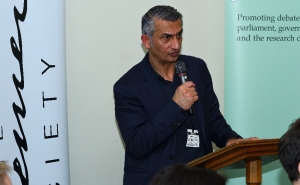 Gordon is one of our Bessemer Lifetime Fellowship Awardees. He received the Award among other things for his passion to build value from manufacturing, and his belief to succeed. Both are a necessary reminder and source of inspiration for our hard tech community.
Gordon is one of our Bessemer Lifetime Fellowship Awardees. He received the Award among other things for his passion to build value from manufacturing, and his belief to succeed. Both are a necessary reminder and source of inspiration for our hard tech community.
Gordon began by explaining the remarkable features of Oxford Nanopore’s hand-held DNA sequencing technology – how it can take a protein (nanometre dimensions); put it in a device with a “hole” the perfect size for passing through a single strand of DNA; and instead of a DNA sequencer the size of a mainframe, fit this into your hand, and decode a full genome in 15 minutes.
The technology couples single cell biology with electronics and belongs to what Gordon called the “Internet of Living Things”. He does not worry about specific markets, but on how the technology will disrupt markets, quoting Steve Jobs who said, ‘people don’t know what they want until you give it them’.
The company recently started operating a large manufacturing facility on the Harwell Campus where it has capacity to make one billion disposable flow cells for the handheld reader. He calls it an “extremely powerful razor inside a razor blade” business model.
Gordon always keeps in mind how much value Illumina Inc gained from its acquisition of Solexa in Cambridge, and what Solexa lost by selling out so early. He is determined not to sell out without adding as much value as possible. Most of the key breakthroughs in the science of genomics profiling occurred at universities in the UK, he adds, which is why funding for basic research needs to continue: “All applications come from basic science initially.”
His advice to government is to “take big bets to back winners – and avoid weak bets”. The success of the London Olympics shows how it can be done. He closed by reminding us what the Victorians achieved, and how we need to capture that spirit again. A strong nod towards Sir Henry Bessemer and his ilk.
KEYNOTE: DREW NELSON
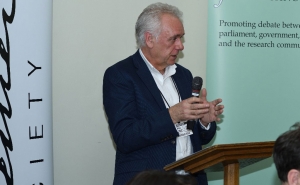 IQE is the global leader in epitaxial wafers for compound semiconductor chips; it employs 650 people worldwide; has annual revenues of around $200mil and a valuation that is “much, much less than Oxford Nanopore”.
IQE is the global leader in epitaxial wafers for compound semiconductor chips; it employs 650 people worldwide; has annual revenues of around $200mil and a valuation that is “much, much less than Oxford Nanopore”.
Compound semiconductors are at the heart of the global information network (optical fibres and satellite communication); they are in electro-optical devices like LEDS, which have a huge impact on carbon reduction; and in emerging fields like LIDAR for autonomous driving, or real-time bio-sensing and diagnostics for the ‘Internet of Living Things’.
The dinner provided an opportunity to ring the changes on the strengths of the UK in these fields, “with many of them present here in this audience” and to secure awareness and support to build a value added manufacturing community.
Drew made three suggestions for how the UK can take maximum economic advantage of the underlying technology transitions:
- Make sure high tech manufacturing is at the heart the new industrial strategy.
- Build sovereign capability in the core underlying technologies on which end industrial sectors will rely.
- Ensure end to end supply chains across all the key industrial verticals, such as communications, automotive, aerospace, healthcare, robotics, etc.,
Drew referred back to the Bessemer dinner in Bristol last year at which the legacy of the government-funded semiconductor company, Inmos, was evoked in the form of the many ex-Inmos executives who were present, notably the speakers, Sir Hossein Yassaie, former CEO of Imagination Technologies Ltd, and Nigel Toon, CEO of Bristol-based Graphcore Ltd. Alongside Arm, these are the UK’s strongest semiconductor companies. Yet all of the chips they design are made in Taiwan or Singapore, where “Arm derives 2-3% of the chips’ value, while the chip makers account for 70% of the value and at least 10 times more employment”.
The Asian “Tiger economies” also derive their success from the fact that they spend most of their R&D dollars on near market product development, while they rely on countries like the UK to do the heavy lifting of the ‘R’. By comparison the UK government until recently spent 10x more money in early stage (TRL 1-3) than in prototyping (TRL 4-6) and almost nothing in near market (TRL 7-8).
One of the principal reasons he believes is due to the State Aid rules imposed by the EU to prevent countries unfairly supporting their own industries, even though European countries “applied these rules more liberally than the UK”. By 2011 the EU was forced to recognise that the decline of manufacturing high tech chips in Europe (from 25% to 8% in two decades) was leaving it reliant on “perhaps not so friendly nations” for key underpinning technologies.
The Commission invited the ‘High Level Group for Key Enabling Technologies’, of which Drew was the sole representative from the UK, to propose solutions. Recognising the harm caused by State Aid Rules, they proposed to invoke an existing scheme called ‘Important Projects of Common European Industry’ which could give the semiconductor industry an exemption from the restrictions. The Group is made up of five ‘chapters’, one of which is for Compound Semiconductors led by IQE and supported by several additional UK organisations. However, while Germany, France and Italy have taken advantage of the change to commit large budgets to invest in their industries, the CS chapter has received no support from the UK government.
Drew warns that the government’s industrial strategy puts too much focus on investing in broad ‘challenges’, but not enough in the enabling technologies. In his early career he worked at BT’s research laboratories when BT led the world in optic fibre communications and served a supply chain led by companies such as STC, Plessey, and GEC, all of whom competed internationally. Now BT is almost entirely dependent on Huawei, yet Huawei’s founder told the Chinese government when he set out that a country which doesn’t control its own communications infrastructure is like a country that doesn’t have control of its own army.
Supply chains are so important said Drew because “value multiplies at an exponential rate the further up the supply chain you travel”. He gave an example of a pilot scheme in the automotive industry led by McLaren, which involves all the steps in chip production, from the wafer to a power device and into an electric car. It has funding of £20mil, however to bring it to mass production will require 30x-50x more money.
In South Wales, IQE and partners have created “the world’s first CS cluster” which is supporting 2000 jobs in an end-to-end supply chain. Their aim is “to build a sovereign platform” for all the key industrial verticals in the UK. Drew’s call to government is that a long term vision for Compound Semiconductors is needed to help achieve this, like Taiwan had for Silicon chip manufacture, which will then underpin these supply chains. It will require the collective will of all involved to make it happen, so it is a powerful call.
AFTER DINNER
There was a great deal of catching up after the dinner.
- Drew Nelson engages with Jessica Skilbeck of BEIS; while Charles Keen (facing) and Scott White take a keen interest.
- A cluster forms around Simon Thomas of Paragraf Ltd, with his chairman, Sir Colin Humphreys to his right, and Ann Hughes, MD of Pegasus Chemicals, to his left.
- Others linger at the table to continue discussion. From left: Sam Cockerill (Libertine FPE), Iain Mosely (Converter Technology), Nigel Salter (Badger) and Geoff Haynes (Inspirit Ventures)
ACKNOWLEDGEMENTS
We are extremely grateful to the following for their financial support and goodwill which makes it possible to strengthen and build the Hard Tech community.
Marks & Clerk: is a leading international group of intellectual property service providers, employing over 300 legal practitioners worldwide.

Royds Withy King: is a leading law firm with a strong presence across the west of England, including the Oxford-Thame valley, and London.

Consilium Recruit: is a specialist in the recruitment of qualified engineering, management level, and industry executives in engineering, manufacturing and advanced technology.

National Physical Laboratory: founded in 1900, is the national measurement standards laboratory for the United Kingdom.

Alex Stewart
March 24, 2020






